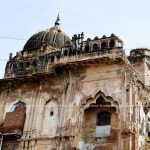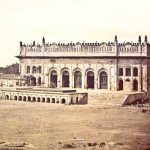Kaptaan Baba
Unusual offerings for a British soldier in Lucknow
“Offering a cigarette or bidi with pious mind can lead to fulfillment of the wishes. Devotees took to the practice of alcohol and cigarettes because the captain was thought to be fond of it,” says Shri Pal, self appointed caretaker of an unusual grave of a British soldier, which a mazaar (shrine).
Captain Frederick Wale died during the first war of Independence in 1857 in Lucknow, India. His shrine is located in the vicinity, at the palace garden ruins of Musabagh on the outskirts of Lucknow, once a garrison of British during colonial rule in North India.
Unlike many other tombs of British soldiers killed in the Lucknow mutinity of 1857, only the tomb of Wale has been accorded with a status of a ‘Saint’. Worshippers pray to him to help with marital discords, business problems and diseases and offer beer, cigarettes and bidis (a cigarette made of unprocessed tobacco wrapped in leaves).
However, no one there exactly knows how he was considered as a saint and from where did this legend of strange offering originated. Locals here say that their ancestors worshipped him, so they also carry out their age-old rituals in respecting the captain who regularly fulfill their wishes.

Kaptaan-Baba-Musa-Bagh
But Wale’s tomb fame has travelled far and wide, with devotees from nearby towns pouring in with packs of cigarettes and liquor bottles in hand. Locals have rechristened him as ‘Kaptaan Baba’ referring the Captain as ‘Father figure’ and devotees circumambulate the tomb and thank the ‘Baba’ for fulfilling their wishes.
Baba listens to us, I was going through financial crisis, and I visited the place a couple of times with cigarettes and beer as offerings. My business is flourishing now,” says Narendra Yadav, who has been following the ritual every Thursday when most devotees pour in.
Like him there are others who have spoken of Wale’s charisma of answering their prayers, devotees even sing prayers referring ‘Kaptaan Baba'(Captain) as God.
People may smirk over gullible etiquettes of the locals, but there is sincerity in their belief, that despite the fact most of them are not addicted to alcohol and cigarettes but still don’t hesitate to use them as offerings.
Wale entered the East India Company’s service in 1840 and was posted to the 48th Bengal native infantry. He later became a lieutenant and was then appointed as brigade-major, who raised and commanded the first Sikh irregular cavalry in Peshawar (now in Pakistan) moved to Lucknow during the battle of 1857.
Buried at Musabagh, his whitewashed tomb reveals a faded inscription that reads- Captain Wale was killed on 21st March, 1858 in the campus of Musabagh, his tomb was erected by Captain L.B. Jones –the acting commandant of the first Sikh irregular cavalry. The epitaph further reads- Captain Wale lived and died like Christian soldier.
In a country of several shrines, which fulfill their different wishes, are given several offering but Captain Wale stands out, not just because of the unusual offering devotees present him, but the fact is he was not a saint.
Uzair Rizvi

Musa Bagh




